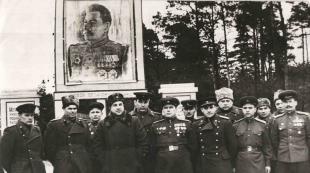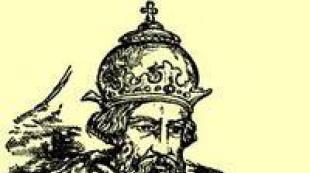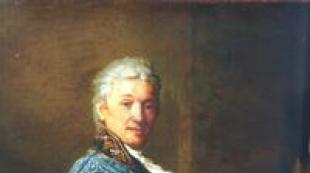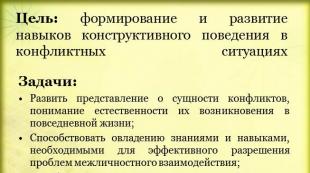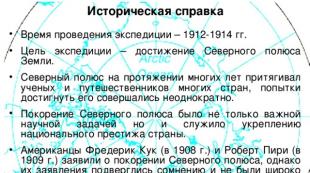In which principality did Yaroslav Osmomysl rule? The meaning of Yaroslav Vladimirikovich (osmomysl) in a brief biographical encyclopedia. father's right hand
Like all the princes of Ancient Russia, Yaroslav Osmomysl is Rurikovich. His grandfather - Volodar Rostislavovich, Prince of Zvenigorod (ruled from 1085 to 1092) - was the great-grandson of his father, Vladimir Volodarevich (youngest son of Volodar Rostislavovich), also known by the nickname Vladimirko (years of life - 1104-1153), became the creator of a single Galician principality and the founder of the first Galician dynasty.
Prince roots
Yaroslav Osmomysl himself (c. 1130-1187) successfully continued his father's work of gathering all the Galician lands into a single state. Vladimirko was married (by assumption) to Sophia of Hungary, daughter of Kalman I, or Colomon I the Scribe (1070-1116). As can be judged by the nickname, the Hungarian king from the Ariad dynasty was a wise ruler and a well-read person. The son-in-law came to the court, since the nickname "Osmomysl", according to one version of the versions, means "having eight minds", and according to another - "knowing eight languages", that is, not stupid at all. In 1149, Vladimirko Volodarevich concludes an alliance with the Moscow prince Yuri Dolgoruky, directed against the Kyiv prince Izyaslav Mstislavovich (the first of the Russian princes, whom he calls "tsar"), because the Galician princes tried to achieve independence from Kyiv. To reinforce the union, the children of the princes marry - Yaroslav Osmomysl takes Olga Yuryevna as his wife.

Ascension to the throne
In 1153, at the very peak of the war with Izyaslav II Mstislavovich, when Vladimirk had already captured the cities along the Goryn River, the prince suddenly dies, and the Galician boyars put Yaroslav Vladimirkovich on the throne, who verbally tried to assure the great Kyiv prince Izyaslav of his filial love and obedience. In fact, either he himself or his boyars tried only to gain time and did not think of returning the conquered cities. And again goes to war against the recalcitrant Galich. Near Terebovl (February 16, 1154), in a bloody battle that lasted all day and ended late at night, no one achieved a decisive victory, and the troops were withdrawn. Izyaslav did not regain the captured cities, and soon, in the same 1154, he died. Yaroslav's father-in-law, who was a long-time ally of the Galicians, sits on the Kyiv throne. However, peace and good relations between Galich and Kyiv did not last long, because Yuri Dolgoruky went to another world in 1157, and Izyaslav III Davydovich sat down to reign.

Competitor to the Galician throne
Yaroslav Osmomysl had a sworn enemy in the person of his cousin - the exiled Galician prince Ivan Rostislavovich Berladnik (at his seat in the city of Berlad). Years of life of Ivan Rostislavovich, who claimed the Galician throne - 1112-1162. Izyaslav III, who sat on the great reign, patronized Berladnik in the hope that, having taken the Galician throne, he would return to Kyiv all the cities captured by Vladimir. In the future, Prince Yaroslav Osmomysl pursues a smart and subtle policy, making alliances with former enemies, for example, with the son of Izyaslav II, Mstislav Izyaslavovich. As a result of his reign, it fell into decay, ruined by the eternal numerous heirs, and Galicia grew stronger and richer, growing with new territories.
Expelling the inner enemy
Izyaslav III, incited by Berladnik, having made an alliance with the Polovtsians, Turks and Berendeys, attacked Mstislav, who had settled in Belgorod. But after the betrayal of the Berendeys, he was forced to flee, leaving the Kyiv throne. Ivan Berladnik, who fled to a foreign land, died in exile. Allies Yaroslav and Mstislav Izyaslavovich surrender the throne of Kyiv As a result, Yaroslav Osmomysl had no opponents left, and external enemies did not dare to attack a strong state capable of repelling.

Increased power
Yaroslav Osmomysl, whose years of rule strengthened and enriched the Galician land, constantly undertook campaigns against the Polovtsy and intimidated them completely. Having given shelter to the exiled Byzantine prince Andronicus Komnenos, the far-sighted Yaroslav, after the reconciliation of the prince with the Byzantine emperor Manuel, concluded an alliance with the latter against the Hungarians. There were no wars on the Galician land, and it did not go bankrupt. The power gained by Yaroslav is also mentioned in the "Word of Igor's Campaign".
Enmity with the boyars
However, at the beginning of his reign, and even then, Yaroslav overcame the opposition of the boyars all the time. According to historical evidence, nowhere in Russia the boyars were as strong as in the western outskirts. Their willfulness reached the point that they publicly and solemnly burned Anastasia alive at the stake, the beloved woman of Yaroslav, who gave birth to his no less beloved son Oleg. Yaroslav himself and his son were kept in captivity until he swore an oath to reunite with his wife Olga, who was in Poland, and to bequeath the throne to Vladimir, her son. Olga solemnly returned to Galich at the invitation of the boyars, but Yaroslav, who was released a year later, restored his power over the powerful aristocratic elite, reconciled with his son Vladimir, but still bequeathed the throne to Oleg.

The prosperity of the principality and the death of Yaroslav
Having defended his principality from external and internal enemies, Yaroslav devoted all his strength to the economic development of Galicia. Under him, crafts flourished, sensible foreigners were taken into service. All trade along the Danube depended on Yaroslav Osmomysl, since he owned the port of Maly Galich. The principality was especially active in trade with Bulgaria and Byzantium. Yaroslav Osmomysl, whose biography ended in Galich in 1187, was buried there. Shortly after the beginning of his reign, Oleg was poisoned, and Vladimir, whom his father sent to Przemysl, also took possession of the Galician throne. In 1939, the burial place of Yaroslav Osmomysl was discovered by archaeologist Yaroslav Pasternak.

Board results
The reign of Yaroslav Osmomysl falls on the era of the flourishing of feudalism in the Carpathian states. During the years of sitting on the throne of Galicia, Yaroslav Osmomysl managed to stop the troubles in the entire principality. Twice he conquered Kyiv and planted princes loyal to him on the great reign. He strengthened external ties - with the Polish princes, the Hungarian king and Byzantium. With the Moscow principality, he traditionally maintained friendly relations. For his wise rule from the people under his rule, Yaroslav received the nickname Osmomysl.
Yaroslav Vladimirkovich (Osmomysl) - Prince of Galicia (died in 1187), son of Vladimir Volodarevich. In 1153 he fought with Izyaslav II Mstislavovich, Grand Duke of Kyiv, because of the cities captured in Volhynia by his father, which Yaroslav did not wanted to return. The battle at Terebovl was indecisive, but Izyaslav retreated without taking the disputed cities from Yaroslav. In 1158, Yaroslav had a quarrel with Izyaslav Davidovich, who was sitting in Kyiv, because of the exiled Galician prince, Ivan Rostislavich Berladnik, the enemy of Yaroslav, whom Izyaslav supported in his desire to return the lost Galician volosts.
In alliance with other princes, with the support of the king of Hungary and the princes of Poland, Yaroslav demanded that Berladnik be extradited from Izyaslav, but in vain. Izyaslav, seeing the trouble, reconciled with the Olgovichi of Chernigov and upset the alliance, but then, incited by Berladnik, who was invited to reign by the Galicians dissatisfied with Yaroslav, together with the Polovtsians, Torks and Berendeys, he went to Yaroslav. The latter, with the allied prince Mstislav Izyaslavovich of Volyn, locked himself in Belgorod.
Soon, due to the betrayal of the Berendeys, Izyaslav had to flee from Belgorod. Yaroslav and Mstislav gave the Kyiv table to Rostislav Mstislavich (1159). Ivan Berladnik died in exile in a foreign land, and Yaroslav, until his death, owned the Galician land without rivals, enjoying great importance among the then Russian princes. His squads participated in campaigns against the Polovtsians and he was a thunderstorm for nomads. Yaroslav was in close and family relations with the Byzantine emperors.
The Byzantine prince Andronicus (1164), who was persecuted by Emperor Manuel and who, it seems, was a cousin of Yaroslav by his mother, found refuge in Galicia. Andronicus soon made peace with Emperor Manuel, and Yaroslav concluded an alliance with the latter against the Hungarians (1167). In 1170, Yaroslav helped Mstislav II, who was expelled from Kyiv Izyaslavich to return this city. In general, Yaroslav had a great influence in the disputes of the princes for the grand princely Kyiv table. The power of Yaroslav can be judged from the words of a contemporary, singer of the Word about Igor's regiment: “Galician Osmomysl-Yaroslav! You sit high on your gold-plated table; propped up the Ugrian mountains with his iron regiments, blocking the way for the king (Hungarian); shut the gates of the Danube A thunderstorm of your name flies around the earth; you open the gates to Kyiv and shoot from your father’s golden table at the distant Saltans (Polovtsian) ”Yaroslav gained no less respect from his contemporaries with his concerns about the welfare of Galician Rus. Under him, trade, industry and land ownership flourished; Galician land maintained trade relations with Bulgaria and Byzantium; owning Small Galich, Yaroslav held in his hands the key to the Danube trade.
Not without reason, for his caring, wise rule, Yaroslav received the nickname Osmomysl (i.e., thinking for eight). Despite all the power, Yaroslav had to experience opposition from the Galician boyars, who, following the example of the neighboring Polish and Hungarian nobility, rallied into a powerful and wealthy aristocracy.
The strife between Yaroslav and the boyars was especially revealed during Yaroslav's break with his wife Olga, daughter of Yuri Dolgoruky, whom he, in 1172, forced to flee, along with her son Vladimir.
Yaroslav at that time loved another woman, some kind of Anastasia, and preferred her and her son Oleg over his legitimate wife and son. A party of dissatisfied boyars staged a rebellion in Galich, seized and burned Anastasia alive, and forced the prince to swear that he would live in harmony with his wife.
The following year, however, Olga and her son had to flee from Galich to Vladimir-Suzdal. Yaroslav managed to restore his power over the boyars and reconcile with his son Vladimir, but he continued to give preference to Oleg and, dying (1187), left the main table (Galic) to his illegitimate son, Oleg, and the eldest and legitimate, Vladimir, a small Przemysl. The Galician Zemsky Veche did not dare to disobey this order. For literature on Yaroslav, see the article Galician Principality.
What will we do with the received material:
If this material turned out to be useful to you, you can save it to your page on social networks:
The pseudonym under which the politician Vladimir Ilyich Ulyanov writes. ... In 1907 he was unsuccessfully a candidate for the 2nd State Duma in St. Petersburg.
Alyabiev, Alexander Alexandrovich, Russian amateur composer. ... The romances of A. reflected the spirit of the times. As then-Russian literature, they are sentimental, sometimes corny. Most of them are written in a minor key. They almost do not differ from Glinka's first romances, but the latter has stepped far ahead, while A. has remained in place and is now outdated.
Filthy Idolishche (Odolishche) - an epic hero ...
Pedrillo (Pietro-Mira Pedrillo) - a famous jester, a Neapolitan, who arrived in St. Petersburg at the beginning of the reign of Anna Ioannovna to sing the roles of buffa and play the violin in the Italian court opera.
Dahl, Vladimir Ivanovich
Numerous novels and stories of his suffer from a lack of real artistic creativity, a deep feeling and a broad view of the people and life. Dal did not go further than everyday pictures, anecdotes caught on the fly, told in a peculiar language, smartly, lively, with well-known humor, sometimes falling into mannerism and joking.
Varlamov, Alexander Egorovich
Apparently, Varlamov did not work on the theory of musical composition at all and remained with the meager knowledge that he could have taken out of the chapel, which at that time did not care at all about the general musical development of its pupils.
Nekrasov Nikolai Alekseevich
None of our great poets has so many verses that are downright bad from all points of view; he himself bequeathed many poems not to be included in the collection of his works. Nekrasov is not sustained even in his masterpieces: and in them the prosaic, sluggish verse suddenly hurts the ear.
Gorky, Maxim
By his origin, Gorky does not at all belong to those dregs of society, of which he acted as a singer in literature.
Zhikharev Stepan Petrovich
His tragedy "Artaban" did not see a print or a stage, since, according to Prince Shakhovsky and the author's frank opinion, it was a mixture of nonsense and nonsense.
Sherwood-Verny Ivan Vasilievich
“Sherwood,” writes one contemporary, “in society, even in St. Petersburg, was not called anything but Sherwood nasty ... his comrades in military service shunned him and called him the dog name “fidelka”.
Obolyaninov Petr Khrisanfovich
... Field Marshal Kamensky publicly called him "a state thief, a bribe-taker, a fool stuffed."
Popular biographies
Peter I Tolstoy Lev Nikolayevich Ekaterina II Romanovs Dostoevsky Fyodor Mikhailovich Lomonosov Mikhail Vasilyevich Alexander III Suvorov Alexander Vasilyevich
Yaroslav Osmomysl, whose biography continues the Rurik dynasty, did not interrupt the work begun by his father, Prince Vladimirko.
The son of Vladimir Volodarevich created a single Galician principality and founded the first Galician dynasty. The new state was really rich and powerful, and the prince was a strong and respected ruler.
For wisdom and prudent policy, Yaroslav was nicknamed Osmomysl, which means "has 8 minds." The prince was fond of philosophy, science and art. Another suggestion is “a person who speaks eight languages.
Years of life
The future Galician prince was born in 1130. He entered the reign in 1153. Died in 1187.
Years of government
Yaroslav knew from childhood that he would take the place of his father, so he went on hikes with him, adopted the skills of managing affairs. Prince Vladimirko died in 1153 and the grown-up son took the throne of Galich. Yaroslav had to start ruling in an unsuccessful principality:
- Location surrounded by enemies. In the east there are steppes and Polovtsians. In the west - the hostile countries of Hungary and Poland. From the south - restless Byzantium.
- During his lifetime, his father, considering the principality strong, was preparing to fight with Kyiv - hail.
- The main role in the politics of the principality was played by the boyars, who felt like masters and interfered in the affairs of the ruler.
The young prince began his reign by correcting his father's mistakes. The Kyiv ambassador, sent away by the old prince, has been returned, but war with Kyiv is inevitable. The battle with the troops of Izyaslav Mstislavovich took place near Terebivl. But Yaroslav did not have to participate, as he was sent to the city by the Galician boyars. The battle ended with equal success on both sides. The years of peaceful rule began.
Yaroslav Osmomysl constantly monitors order in his own principality, in the prince's squad there are smart and brave governors. Neighbors did not dare to attack, as the princely army often helped out of trouble. The Principality prospered, populated by artisans and craftsmen who came from everywhere. Cities rose, culture developed. Trade was established with Greece and with other neighboring countries.
After 5 years, the war with the Kyiv prince was repeated. This time with Izyaslav Davydovich, who tried to take the Galician throne for Yaroslav's cousin - Ivan Rostislavich, nicknamed Berladik. This is Ivan's second attempt to seize Galich. Prince Yaroslav was supported by Mstislav, Prince of Volhynia.
By joint efforts, the princes dealt with the Kyiv army, and Berladik fled to Byzantium, where he soon died. Yaroslav Osmomysl, a powerful ruler, constantly sought to expand his own possessions. By the end of the 34-year reign of the prince, the Galician principality was considered the strongest in Russia, with which neither neighbors nor foreign states quarreled.
Domestic politics
Local boyars constantly intervened in the reign of the prince, and even in his personal life. Causes of boyar arrogance and insolence:
- Galich is removed from the capital Kyiv and the Grand Duke's ignorance of ongoing affairs.
- For a long time without a ruler, the Galician boyars became rich in profit. Having concentrated the economic power of the principality in their own hands, they became independent of the prince.
- The boyars had their own army.
- For 200-250 years, the boyars used the tribal dynasty, and there were no foreign wives. Therefore, internal coups were ruled out.
In 1171, Yaroslav quarreled with his wife, as he fell in love with another woman who bore the prince a son. Olga, wife, took her son Vladimir and settled in Poland. Dissatisfied boyars immediately took advantage of the situation, causing a split in Galich into two camps. Some agreed with the transfer of the throne to the younger, illegitimately born Oleg, others supported Olga with her legitimate son.
Riots and riots broke out in Galich. Osmomysl was arrested and forced to swear peace with his wife. Power over the boyars was restored. The irreconcilable Vladimir, after wandering around the principalities, returned to his father, which served as a complete reconciliation.
Foreign policy
Prince Yaroslav Osmomysl defended the security of Russian lands, guarding against Polovtsian raids. In addition, he spread his own influence on the "fragments" of Kievan Rus. In matters of reign, he used the help of his father-in-law, Yuri Dolgoruky. In 1159, together with the prince of Volyn, Mstislav, he placed Rostislav Mstislavich, the grandson of Vladimir Monomakh, on the throne of Kyiv.
Byzantine relations were helped by chance. Yaroslav sheltered the Byzantine prince Andronicus from the persecution of Emperor Manuel. The prince endowed the guest with several towns, settling the Greek in his place. A year later, Andronicus and the emperor reconciled, and Manuel and Osmomysl concluded an agreement on a joint fight against the Hungarians. This happened in 1167.
Two years earlier, Prince Galitsky agreed with the linear relationship established by Emperor Frederick I Barbarossa. An episcopal see appears in Galich. In 1971, dangerous political complications arose with Poland, which were caused by the act of the prince's wife. Yaroslav had to make diplomatic efforts to return Olga and her son.
The reign of Osmomysl strengthened the Russian borders, and the Galician principality, like a shield, covered the rest of the territory. Yaroslav with his retinues saved Russia several times from the raids of the cruel Polovtsians. To strengthen the union, he married his daughters to the Hungarian king Stephen and the Polish prince Odon.
Wife and kids
At the age of 19, Yaroslav married Olga, the daughter of Yuri Dolgorukov, in order to strengthen his father's alliance in the fight against Izyaslav Mstislavich, the prince of Kyiv. In this marriage, the son Vladimir was born. Then three daughters were born:
- eldest daughter, married in Hungary, second marriage with the Novgorod prince Mstislav Rostislavich;
- Sfrosinia (Yaroslavna) married Novgorod - Seversky Prince Igor Svyatoslavich;
- Vysheslava was given to Odon, the Polish prince.
The second, beloved son Oleg, was born from an unmarried wife, Anastasia, who was burned at the stake by the boyars.
Relationship with Yuri Dolgoruky
The Galician princes established independence from the king, the Kyiv prince Izyaslav. To strengthen their forces, Vladimirko and, in 1149, seal the union by marrying the children of Yaroslav and Olga. But in the outbreak of war, the army of Vladimir Volodarevich was defeated. As for Yaroslav, the first time after accession to the throne, the young prince depended on his wife's father, understanding the difficulty in holding the throne. With the death of his father-in-law, having reigned for 5 years, Yaroslav becomes an independent and independent ruler.
Doom
Yaroslav Osmomysl, lived 57 years and died in his native city. The dying prince directs Oleg, the son of Anastasia, to rule in Galich, and Vladimir - in Przemysl. The boyars, who did not dare to argue with Yaroslav, who was dying, the next day after the funeral, rebelled again. Oleg, after one year of reign, was poisoned, and after 8 years, in 1198, Vladimir also died.
The first Galician dynasty had no continuation. The Assumption Cathedral became the last place of refuge for Prince Yaroslav. The coffin with the remains, found in 1938, was reburied in the chapel under the temple, where rich people rested.
Results
Ruled by Yaroslav Osmomysl during the rapid flowering of Carpathian feudalism. Civil wars and the division of thrones flourished in all territories. The prince managed to establish peace in the territory of the principality. Twice he managed to conquer Kyiv and put loyal princes on the throne.
Yaroslav Vladimirovich secured ties with Poland, Hungary and with the Byzantine emperor, maintained friendship with the Prince of Moscow. Prince Osmomysl increased the prosperity of the Galician principality through trade relations, developed industry and agriculture.
Yaroslav Vladimirovich (Vladimirkovich) Osmomysl(c. 1130-October 1, 1187), Galich) - Prince of Galicia (1153-1187), son of Vladimir Volodarevich. Mother (presumably) - Sophia of Hungary, daughter of King Kalman the Scribe (1070-1116). Osmomysl means "he who has eight minds," that is, very clever.
Biography
In 1149, Yaroslav married Olga, daughter of Yuri Dolgoruky, in commemoration of his father's alliance with him against Izyaslav Mstislavich, Grand Duke of Kyiv. After the death of his father in 1153, he himself fought with Izyaslav because of the cities captured in Volhynia by his father. The battle near Terebovl was bloody, in its final the Galicians lost many people as prisoners. Izyaslav retreated in exchange for Yaroslav's recognition of his seniority.
In 1158, Yaroslav had a quarrel with Izyaslav Davydovich, who was sitting in Kyiv, because of the exiled Zvenigorod prince Ivan Rostislavich Berladnik, Yaroslav's cousin, whom Izyaslav supported in his desire to return the Galician throne. In alliance with other princes and with the support of the king of Hungary and the princes of Poland, Yaroslav demanded that Berladnik be extradited from Izyaslav, but in vain. Izyaslav, incited by Berladnik, who was invited to reign by the Galicians dissatisfied with Yaroslav, together with the Polovtsians, Torks and Berendeys, went to Yaroslav. Yaroslav's ally Mstislav Izyaslavich of Volyn was besieged by this army in Belgorod-Kiev. Soon, due to the betrayal of the Berendeys, Izyaslav had to flee from Belgorod. Yaroslav and Mstislav gave the Kyiv table to Rostislav Mstislavich (1159). Ivan Berladnik died in exile in a foreign land, and Yaroslav, until his death, owned the Galician land without rivals, enjoying great influence among the then Russian princes. His squads participated in campaigns against the Polovtsians and he was a storm of these nomads.
Yaroslav was in close and family relations with the Byzantine emperors. The Byzantine prince Andronicus (1164), persecuted by Emperor Manuel, found refuge in Galicia. Soon Andronicus made peace with Emperor Manuel, and Yaroslav concluded an alliance with the latter against the Hungarians (1167).
In 1170, Yaroslav helped Mstislav Izyaslavich, expelled from Kyiv, to return the great reign (see Siege of Vyshgorod (1170)).
In general, Yaroslav had a great influence in the disputes of the princes for the grand princely Kyiv table. Power can be judged from the words of a contemporary, singer of the Word about Igor's Campaign:
Yaroslav gained no less respect from his contemporaries with his concern for the well-being of Galician Rus. Under him, trade, industry and agriculture flourished; Galician land maintained trade relations with Bulgaria and Byzantium; owning Small Galich, Yaroslav held in his hands the key to the Danube trade. Not without reason, for his caring, wise rule, Yaroslav received the nickname Osmomysl (that is, he thinks for eight, another common interpretation is that he speaks eight languages).
The fight against the boyars
Despite all the power, Yaroslav had to experience opposition from the Galician boyars, who, following the example of the neighboring Polish and Hungarian nobility, rallied into a powerful and wealthy aristocracy. The strife between Yaroslav and the boyars was especially revealed during Yaroslav's break with his wife Olga, whom he forced to flee with her son Vladimir to Poland in 1171. Yaroslav at that time loved another woman, a certain Anastasia, and preferred her and her son Oleg over his legitimate wife and son. A party of dissatisfied boyars staged a rebellion in Galich, seized and burned Anastasia alive, and forced the prince to swear that he would live in harmony with his wife. The following year, however, Olga and her son had to flee from Galich to Vladimir. Yaroslav managed to restore his power over the boyars and reconcile with his son Vladimir.
